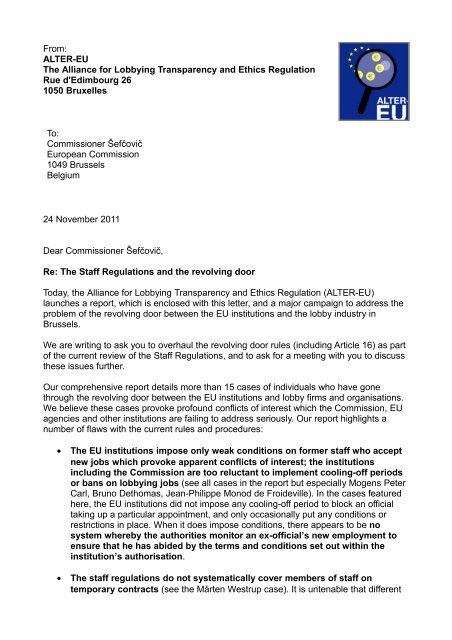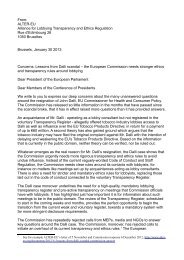Commissioner - ALTER-EU
Commissioner - ALTER-EU
Commissioner - ALTER-EU
You also want an ePaper? Increase the reach of your titles
YUMPU automatically turns print PDFs into web optimized ePapers that Google loves.
From:<br />
<strong>ALTER</strong>-<strong>EU</strong><br />
The Alliance for Lobbying Transparency and Ethics Regulation<br />
Rue d'Edimbourg 26<br />
1050 Bruxelles<br />
To:<br />
<strong>Commissioner</strong> Šefčovič<br />
European Commission<br />
1049 Brussels<br />
Belgium<br />
24 November 2011<br />
Dear <strong>Commissioner</strong> Šefčovič,<br />
Re: The Staff Regulations and the revolving door<br />
Today, the Alliance for Lobbying Transparency and Ethics Regulation (<strong>ALTER</strong>-<strong>EU</strong>)<br />
launches a report, which is enclosed with this letter, and a major campaign to address the<br />
problem of the revolving door between the <strong>EU</strong> institutions and the lobby industry in<br />
Brussels.<br />
We are writing to ask you to overhaul the revolving door rules (including Article 16) as part<br />
of the current review of the Staff Regulations, and to ask for a meeting with you to discuss<br />
these issues further.<br />
Our comprehensive report details more than 15 cases of individuals who have gone<br />
through the revolving door between the <strong>EU</strong> institutions and lobby firms and organisations.<br />
We believe these cases provoke profound conflicts of interest which the Commission, <strong>EU</strong><br />
agencies and other institutions are failing to address seriously. Our report highlights a<br />
number of flaws with the current rules and procedures:<br />
• The <strong>EU</strong> institutions impose only weak conditions on former staff who accept<br />
new jobs which provoke apparent conflicts of interest; the institutions<br />
including the Commission are too reluctant to implement cooling-off periods<br />
or bans on lobbying jobs (see all cases in the report but especially Mogens Peter<br />
Carl, Bruno Dethomas, Jean-Philippe Monod de Froideville). In the cases featured<br />
here, the <strong>EU</strong> institutions did not impose any cooling-off period to block an official<br />
taking up a particular appointment, and only occasionally put any conditions or<br />
restrictions in place. When it does impose conditions, there appears to be no<br />
system whereby the authorities monitor an ex-official’s new employment to<br />
ensure that he has abided by the terms and conditions set out within the<br />
institution’s authorisation.<br />
• The staff regulations do not systematically cover members of staff on<br />
temporary contracts (see the Mårten Westrup case). It is untenable that different
ules apply to officials depending on whether they are permanent staff or whether<br />
they are employed on a contract. Conflicts of interest are conflicts of interest no<br />
matter what kind of employment basis an employee has. In addition, a contract<br />
employee’s access to “sensitive information” is irrelevant to any assessment of<br />
potential conflicts of interest.<br />
• The rules applied when officials join an <strong>EU</strong> institution from a lobby job are unclear<br />
and there appear to be no specific procedures which are automatically<br />
applied to review the conflicts of interest when new staff join (see Mårten<br />
Westrup and Laura Smillie cases). Significant conflicts of interest can be created<br />
when lobbyists or others from industry move into a related job in the <strong>EU</strong> institutions.<br />
• The <strong>EU</strong> institutions are unaccountable on the revolving door issue. For<br />
example, the Commission does not pro-actively publish a list of cases nor does it<br />
maintain an internal database of all decisions made on revolving door cases.<br />
• Some former <strong>EU</strong> staff may be using their time in office to negotiate future<br />
private sector roles. The rapidity of some of the moves that ex-officials have made<br />
into the private sector immediately upon leaving a European institution, suggests<br />
that these roles may have been negotiated while the official was in public office.<br />
This would create significant conflicts of interest if the job negotiations have<br />
influenced their work as a public official.<br />
• An unclear and narrow understanding of conflicts of interest appears to be<br />
applied by the <strong>EU</strong> institutions when judging revolving door cases. The<br />
institutions seem to accept unquestioningly statements from the applicants that no<br />
conflicts of interest exist or no lobbying will take place (see Bruno Dethomas and<br />
Luc Werring cases). Yet, according to the precautionary approach taken by the<br />
OECD’s definition of conflicts of interest, decision-making authorities should always<br />
consider the extent to which ex-staff members could exploit know-how, expertise<br />
and contacts gained whilst working at the <strong>EU</strong> institutions, giving new employers or<br />
clients an advantage.<br />
• Decisions are being made on incomplete information. The decision-making<br />
authorities accept what they are told, and make decisions based on a line or two of<br />
information provided by the former <strong>EU</strong> official in their authorisation request.<br />
• Of the cases featured in this report, at least four did not receive authorisation before<br />
starting at least some of their new posts (see Derek Taylor, John Bruton, Thomas<br />
Lönngren and Petra Erler cases). This implies that some staff may not be aware<br />
of the current rules or are not obeying them. There appears to be no sanctions<br />
in place to ensure that officials notify the institution in due time.<br />
• There is no common procedure for implementing article 16 of the staff<br />
regulations across the <strong>EU</strong> institutions. Specifically, each European institution<br />
and agency has to decide how to implement this element of the staff regulations. A<br />
common procedure could help to ensure that the regulations have a higher profile<br />
and are taken more seriously.<br />
We know that the Commission is currently reviewing elements of the staff regulations.<br />
In your confirmation hearing before the Parliament in January 2010, you highlighted the
intention to evaluate how restrictions on post-employment activities could be incorporated<br />
into the Staff Regulations. <strong>ALTER</strong>-<strong>EU</strong> agrees with this and urges you to add the issue of<br />
the revolving door to the agenda of the current review of the Staff Regulations and<br />
specifically to include the following proposals:<br />
• A mandatory cooling-off period (or ban) of at least two years for all <strong>EU</strong> institution<br />
staff members entering new posts which involve lobbying or advising on lobbying,<br />
or any other role which provoke a conflict of interest with their work as an <strong>EU</strong> official<br />
• Tackling the loopholes in the current rules including the exclusion of staff on<br />
(temporary) contracts<br />
• Scrutiny of all staff joining <strong>EU</strong> institutions for potential conflicts of interest. Where<br />
there is a potential conflict of interest between their old job and their new <strong>EU</strong> role,<br />
those persons must recuse themselves from such matters<br />
• Ensure sufficient resourcing to be able to investigate and monitor revolving door<br />
cases<br />
• Publish a full and updated list of all revolving door cases on <strong>EU</strong> institutions'<br />
websites<br />
A detailed set of proposals is enclosed within our report.<br />
We look forward to hearing from you and would appreciate meeting with you to discuss<br />
these issues in more detail at the earliest opportunity.<br />
Yours sincerely,<br />
The <strong>ALTER</strong>-<strong>EU</strong> steering committee<br />
Helen Darbishire (Access Info Europe)<br />
Erik Wesselius (Corporate Europe Observatory)<br />
Marc Gruber (European Federation of Journalists)<br />
Paul de Clerck (Friends of the Earth Europe)<br />
Jorgo Riss (Greenpeace <strong>EU</strong> Unit)<br />
Katrina Perehudoff (Health Action International Europe)<br />
Timo Lange (LobbyControl)<br />
William Dinan (Spinwatch)<br />
Enclosure: Block the revolving door: why we need to stop <strong>EU</strong> officials becoming lobbyists




